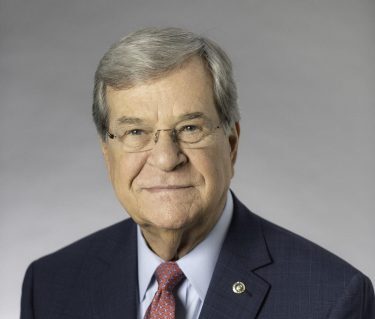
On his 82nd birthday, former U.S. Senator Trent Lott opines on the state of Congress today, while sharing insight into the dysfunction and opportunity for leadership in D.C. from his two books.
Addressing the chaos and uncertainty in an institution he helped lead for more than three decades, former U.S. Senator Trent Lott of Mississippi offered a three-point agenda.
In an interview with Magnolia Tribune, Lott said Congress should heed this advice: “Make up your minds. Vote. Get to work.”
He noted that despite a temporary 45-day reprieve against government shutdown, Congress still needed to fund government. The new, quickly approaching deadline to pass a budget is November 17.
Lott thinks that to stay on pace the U.S. House of Representatives should elect a new Speaker no later than Wednesday, October 11. Two front-runners are House Majority Leader Steve Scalise of Louisiana and Jim Jordan of Ohio, leader of the House Judiciary Committee.
“I really like Scalise; I don’t know Jordan,” Lott said.
Of course, the need to elect a new Speaker comes on the back of bizarre set of political maneuvering that saw eight Republicans, led by Florida firebrand Matt Gaetz, join with the Democratic caucus to oust Kevin McCarthy from the role.
In Lott’s view, booting Speaker McCarthy was a “sad and unfortunate reflection on our politics and our institutions.”
“In our nation’s 246-year history, Congress has never before removed a speaker,” Lott noted. “The challenges we face as a nation are complex and serious. The American people expect their leaders to build consensus and govern.”
Congress should “calm down and show some leadership,” according to Lott. He says real leadership is one critical component to overcoming “broken politics in Washington and across America.”
In 2016, Lott and former U.S. Senator Tom Daschle of South Dakota wrote a book about the dysfunction at the nation’s highest levels, Crisis Point. Lott’s first book, Herding Cats: A Life in Politics, came out in 2007, two years before he resigned his Senate seat.

Described by Open Secrets as “among the titans of influence in Washington, former Senator Trent Lott is a giant.” He and former Louisiana U.S. Senator John Breaux co-founded the Breaux Lott Leadership Group in 2007. From 2010 until 2020, Lott was senior counsel to the Squire Patton Boggs lobbying firm, and in 2020 he joined Crossroads Strategies as a partner.
Celebrating his eighty-second birthday on October 9, Lott laments that the “paralysis in Congress” and “a weak president” is “not good” for America. And with both honest awareness and a sense of humor, he knows politics is hard work.
Having “been there, done that,” Lott affirms the work “really is like herding cats.”
“Cats are not like dogs or cows; they’re ornery,” Lott said. “Cats are Republicans and dogs Democrats. Dogs are on welfare, sweet, and beg for your attention. If you tell a cat to do something, they are like, ‘Are you talking to me?’”
Born in Grenada, living his early years in Duck Hill, and growing up from the sixth grade after his family’s move in Pascagoula, Lott earned both his undergraduate degree in public administration and his law degree from the University of Mississippi. With then future U.S. Senator Thad Cochran, Lott was a cheerleader and also president of Sigma Nu fraternity.
Life in politics cranked up from his service as administrative assistant to House Rules Committee Chairman William M. Colmer, also of Pascagoula. After forty years in Congress, Colmer decided to retire in 1972 and endorsed Lott as his successor. From working with one of the most conservative Democrats in the House, Lott ran as a Republican, won handily, and served from 1973 to 1989. In 1980, he served as Ronald Reagan’s Mississippi state chairman, and then as House Minority Whip, the second-ranking Republican in the House, from 1981 to 1989—the first Southern Republican to hold such a high leadership position.
Stepping up once more to succeed forty-two-year incumbent U.S. Senator John Stennis of Mississippi, Lott won the seat and achieved many leadership positions while in the U.S. Senate. He served twice as Senate Majority Leader and also, alternately, as Senate Minority Leader. Early on, though, he saw the Senate as “the most frustrating place I had ever been in my life.”
“The process was glacial, messy, and unpredictable,” Lott recalls. “All I could do was go along, get along, and start making lists of things I would change in the Senate when I had the opportunity.”
Over time, opportunities abounded, and he wrote about those successes and disappointments in both books.
Reflectively, Lott lists three steps to solve today’s problems: communicate, get to know each other, and value the women and men who are strong – “your leaders are only as strong as the followers. When I had the courage to stand up and lead, they followed.”

Strong of voice, determined, and passionately energetic for public service, Lott, with Daschle, introduced Crisis Point:
The United States government is at a crisis point that requires significant changes in leadership, in action, and most importantly in mind-set… The center can no longer hold under such mindless and unprecedented partisanship; it is no exaggeration to say that the state of our democracy is as bad as we’ve ever seen it.
When they published the book, Daschle and Lott had a combined fifty-nine years in Congress, with over sixteen as Senate majority and minority leaders.
“Among other historic and challenging moments,” the two wrote, “we navigated the impeachment of President Clinton, 9/11 and its aftermath, and anthrax in the Capitol.”
They affirmed that “bipartisanship is the life force that keeps the government running. Bipartisan negotiation is the pumping blood of democracy, and it has run dry in the current Washington landscape.”
“Today’s leaders don’t practice bipartisanship and the environment of the nation’s capital doesn’t allow for it,” the former Senators wrote. “The common ground has been stripped and scorched, leaving no community. The ubiquity of planes and telecommunication have made it feasible to work in Washington without living there.”
Lott believes the “airplane is the biggest enemy.”
“Nobody lives in Washington, D.C., anymore; they just come in and go back home.”
With a three-day work week, members of Congress sleep in their offices – estimates range from the tens to hundreds who live in their offices and sleep on their sofas. Accordingly, they never get to know one another and their families.
In composing their manuscript, the two longtime lawmakers looked back to the founding fathers, to others among their spheres over time, and to such writers as Walter Isaacson who noted “the greatest challenge of leadership is to know when to be flexible and pragmatic, on the one hand, and when it is, instead, a moment to stand firm on principle and clarity of vision.”
One pronouncement could be applicable to the current chaos in Congress – “Courage is sometimes mistaken for disloyalty because it requires a willingness to paddle farther from shore than one’s peers.”
Lott wrote:
Like all institutions, the US Congress is constantly shifting—even more so because its makeup changes every two years. Besides elections, it’s affected by the times and the tides; it evolves and devolves; it sheds its skin and then grows a new one.” Toward the end of his own long term of service, he said that he “began to lose interest in an institution to which I had dedicated my life. The body seemed to have stopped working—or, rather, it was working, just toward things I couldn’t get behind, hijacked by purely political agendas.
But the authors affirm they still have hope for the nation as they share insights “about how to harness the natural conflict from a body of different voices, how to create a culture of chemistry that allows for bipartisanship and compromise, and illustrate why courage is such a necessary component of leadership.”
In addition to examining the “elements of effective leadership,” their book also presents “a vision for how our government can get moving forward to take on the challenges we face.”
Daschle and Lott affirm that the book “is a call to action, a clarion call to our leaders, the voters, the lapsed voters, those in public service, and those considering going into public service.”











